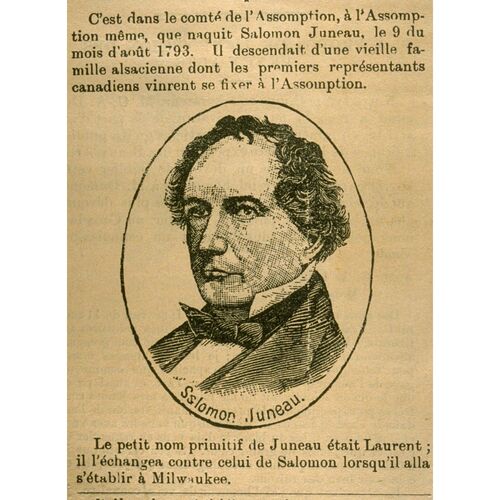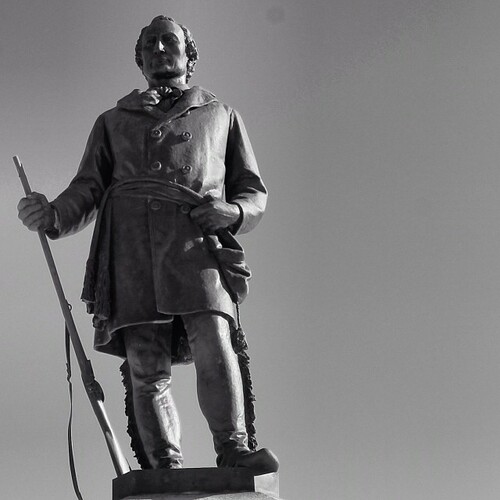JUNEAU, LAURENT-SALOMON, fur trader, office holder, businessman, and politician; b. 9 Aug. 1793 in Repentigny, Lower Canada, son of François Juneau, dit Latulippe, and Thérèse Galarneau; m. probably 1818 or 1819 Josette Vieau, and they had 15 children; d. 14 Nov. 1856 in Shawano, Wis.
Laurent-Salomon Juneau was raised in L’Assomption, Lower Canada, and while still a teenager he left for the fur trade as voyageur for Louis Reaume (Eaume). He apparently traded for the Hudson’s Bay Company some time later and then, in 1818, he signed on as a clerk with the American Fur Company at Fort Michilimackinac (Mackinac Island, Mich.). In early 1819 he took over the post run by his father-in-law, Jacques Vieau, at the mouth of the Milwaukee River on Lake Michigan. Juneau was a big man, standing over six feet two inches tall, and was well adapted by temperament to life as a fur trader. His neighbours and the Indians with whom he did business at the Milwaukee post trusted and respected him because of his generosity and honesty.
In 1832, following the defeat of the Fox and Sauk Indians led by Black Hawk, the area between Lake Michigan and the Mississippi River was considered safe for American settlement. Because of his long residence at the Milwaukee post, Juneau, who had become an American citizen in 1831, had pre-emptive rights to land on the east side of the river. In October 1833 he sold a half-interest in these rights to Morgan Lewis Martin, a resident of the Green Bay area since 1827, and made a claim for 132 acres in his name and 157 in the name of his brother Pierre, who had moved to Milwaukee some time before 1830. These claims were recognized by the United States government in August 1835 and purchased by Juneau and Martin for $361. That year they laid out a plan for the town of Milwaukee on this land.
From 1835 to 1839 Juneau and Martin expended a considerable sum of money on streets and public improvements. A post office for the new town was granted in 1835 and located on land belonging to Juneau, who was appointed postmaster, a position he held until 1843. At a cost of some $8,000 he built a court-house in 1836 so that the county seat would be located in his town, and the following year he set up a newspaper, the Milwaukee Sentinel, helped in the establishment of the Bank of Milwaukee, and with Martin built a hotel, the Milwaukee House. Speculation pushed the price of lots up, and by 1836 Juneau was reported to be worth more than $100,000 in the inflated “wild cat” bank notes circulating at that time.
Caught up in the excitement of speculation, he began buying back his lots at inflated prices and reselling them, guaranteeing the buyer that the lots would double in value within a year. In 1837 a financial panic brought on by President Andrew Jackson’s specie circular of July 1836 put an end to speculation and the price of lots in Milwaukee fell sharply. Juneau, a poor money manager, had borrowed large sums for the civic improvements he had effected and for other projects such as the construction of the steamboat Milwaukee, completed in 1837. With the crash in land prices, he lost virtually everything he had. In 1836 he had been negotiating to buy the American Fur Company interests at Fort Michilimackinac, but by 1838 he could not even pay for his own trade goods.
Despite Juneau’s financial losses and overwhelming debt, he retained the respect of the people of Milwaukee. In 1839 they elected him village president; seven years later, when the city of Milwaukee was incorporated, he was elected its first mayor and served for one term. In 1848 Juneau left Milwaukee and moved to Theresa, Wis., a town he organized on the Rock River and named for his mother. There he operated a store, served as postmaster, and ran a grist-mill.
The death of his wife in 1855 left Juneau a broken man and his health rapidly deteriorated. He was at Shawano on business in November 1856 when he died. His body was taken to Milwaukee for burial and 10,000 people lined the streets to pay their last respects. Today a street, a park, and a large monument honour Juneau as the founder of Milwaukee.
Milwaukee County Hist. Soc. (Milwaukee, Wis.), Solomon Juneau papers. Wis., State Hist. Soc. (Madison), Juneau files, 1836–37; M. L. Martin papers. Wis., State Hist. Soc., Coll., 1 (1855): 130–34; 11 (1888): 218–337, 385–407; 15 (1900): 458–69. Daily Wisconsin (Milwaukee), 28 Nov. 1856. Milwaukee Sentinel, 14, 18 Nov. 1856. DAB. Tanguay, Dictionnaire, 5: 38. J. S. Buck, Pioneer history of Milwaukee . . . (4v., Milwaukee, 1876–86). Isabella Fox, Solomon Juneau; a biography with sketches of the Juneau family (Milwaukee, [1916]). Joseph Tassé, Les canadiens de l’Ouest (2v., Montréal, 1878), 1: 213–37.
Cite This Article
Paul Trap, “JUNEAU, LAURENT-SALOMON,” in Dictionary of Canadian Biography, vol. 8, University of Toronto/Université Laval, 2003–, accessed July 25, 2025, https://www.biographi.ca/en/bio/juneau_laurent_salomon_8E.html.
The citation above shows the format for footnotes and endnotes according to the Chicago manual of style (16th edition). Information to be used in other citation formats:
| Permalink: | https://www.biographi.ca/en/bio/juneau_laurent_salomon_8E.html |
| Author of Article: | Paul Trap |
| Title of Article: | JUNEAU, LAURENT-SALOMON |
| Publication Name: | Dictionary of Canadian Biography, vol. 8 |
| Publisher: | University of Toronto/Université Laval |
| Year of revision: | 1985 |
| Access Date: | July 25, 2025 |


![Salomon Juneau [image fixe] Original title: Salomon Juneau [image fixe]](/bioimages/w600.8478.jpg)


